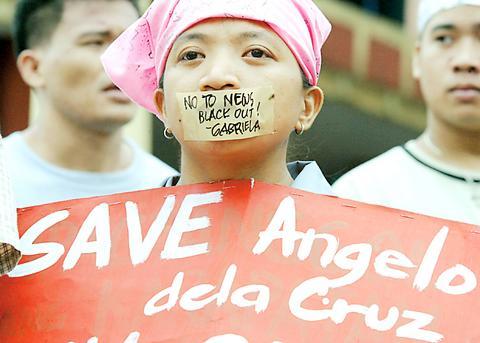An Iraqi official yesterday warned against bowing to kidnappers amid deepening confusion on whether Manila intended to bring its troops home early from Iraq to save the life of a Filipino hostage.
Any Philippine decision to advance the scheduled departure date of Aug. 20 for the 51-strong humanitarian force would be unwelcome to the US and to Iraq's interim government.
Mowaffaq Abboud, an adviser to Iraqi Foreign Minister Hoshiyar Zebari, declined to comment on Manila's stance, but said the government opposed concessions to kidnappers.

PHOTO: REUTERS
"We think it is not a wise idea to give in to the demands of hostage-takers," he said. "This would encourage the terrorists to continue these practices."
The government, trying to enhance its authority after taking over from US-led occupiers on June 28, remains dependent on a 160,000-strong, mostly American, multinational force.
It has promised to wield a "sharp sword" against diehard insurgents and foreign militants, but also plans to offer an amnesty for Iraqi fighters who lay down their arms.
Interim Prime Minister Iyad Allawi has called a news conference for tomorrow, but it was not immediately clear if he intended to use it to announce the long-expected amnesty.
The Philippine army was awaiting word from the government on whether it would withdraw from Iraq by July 20 as demanded by kidnappers threatening to behead hostage Angelo de la Cruz.
Foreign Secretary Delia Albert repeated a statement by her deputy that the Philippines would withdraw its troops "as soon as possible."
But Albert did not clarify what this meant.
Deputy Foreign Minister Rafael Seguis had made the offer in an appeal to the captors which aired on al Jazeera television.
The kidnappers had extended an execution deadline for de la Cruz to Monday night.
They then said they had moved him "to the place of implementing the punishment," al Jazeera said.
A senior Philippine army officer said it would take only three days to withdraw the troops, with US logistical help.
Bulgaria, which has vowed not to withdraw its troops from Iraq, said its two nationals held hostage in Iraq were alive despite the expiry of an execution deadline on Friday.
"The only thing I can confirm ... is that our two compatriots are really alive," Foreign Minister Solomon Passy said. "But the situation is tense and we are concerned because we cannot guarantee a positive outcome."
A group led by Jordanian militant Abu Musab al-Zarqawi had threatened to kill drivers Georgi Lazov, 30, and Ivailo Kepov, 32, unless Iraqi prisoners were freed.
In other Iraq developments yesterday, British Prime Minister Tony Blair and senior government officials received a report on the quality of prewar British intelligence on Iraqi weapons programs, a day before the potentially embarrassing findings were to be released to opposition politicians and the public.
Asked at a news conference whether he believed he had been given "duff intelligence" before the war, Blair said: "I'm afraid I don't accept that at all."
But Blair, speaking at a joint news conference with Italian Premier Silvio Berlusconi, offered no comment on the report.
Also see story:

DAREDEVIL: Honnold said it had always been a dream of his to climb Taipei 101, while a Netflix producer said the skyscraper was ‘a real icon of this country’ US climber Alex Honnold yesterday took on Taiwan’s tallest building, becoming the first person to scale Taipei 101 without a rope, harness or safety net. Hundreds of spectators gathered at the base of the 101-story skyscraper to watch Honnold, 40, embark on his daredevil feat, which was also broadcast live on Netflix. Dressed in a red T-shirt and yellow custom-made climbing shoes, Honnold swiftly moved up the southeast face of the glass and steel building. At one point, he stepped onto a platform midway up to wave down at fans and onlookers who were taking photos. People watching from inside

MAKING WAVES: China’s maritime militia could become a nontraditional threat in war, clogging up shipping lanes to prevent US or Japanese intervention, a report said About 1,900 Chinese ships flying flags of convenience and fishing vessels that participated in China’s military exercises around Taiwan last month and in January last year have been listed for monitoring, Coast Guard Administration (CGA) Deputy Director-General Hsieh Ching-chin (謝慶欽) said yesterday. Following amendments to the Commercial Port Act (商港法) and the Law of Ships (船舶法) last month, the CGA can designate possible berthing areas or deny ports of call for vessels suspected of loitering around areas where undersea cables can be accessed, Oceans Affairs Council Minister Kuan Bi-ling (管碧玲) said. The list of suspected ships, originally 300, had risen to about

A Vietnamese migrant worker yesterday won NT$12 million (US$379,627) on a Lunar New Year scratch card in Kaohsiung as part of Taiwan Lottery Co’s (台灣彩券) “NT$12 Million Grand Fortune” (1200萬大吉利) game. The man was the first top-prize winner of the new game launched on Jan. 6 to mark the Lunar New Year. Three Vietnamese migrant workers visited a Taiwan Lottery shop on Xinyue Street in Kaohsiung’s Gangshan District (崗山), a store representative said. The player bought multiple tickets and, after winning nothing, held the final lottery ticket in one hand and rubbed the store’s statue of the Maitreya Buddha’s belly with the other,

Japan’s strategic alliance with the US would collapse if Tokyo were to turn away from a conflict in Taiwan, Japanese Prime Minister Sanae Takaichi said yesterday, but distanced herself from previous comments that suggested a possible military response in such an event. Takaichi expressed her latest views on a nationally broadcast TV program late on Monday, where an opposition party leader criticized her for igniting tensions with China with the earlier remarks. Ties between Japan and China have sunk to the worst level in years after Takaichi said in November that a hypothetical Chinese attack on Taiwan could bring about a Japanese